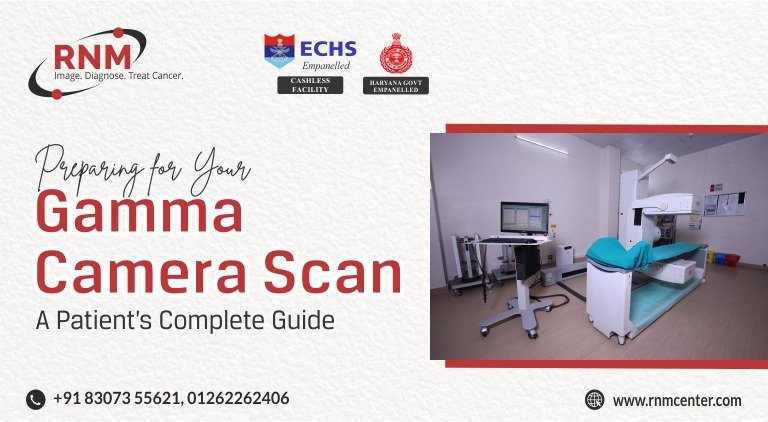Preparing for Your Gamma Camera Scan: A Patient’s Complete Guide
A Gamma Camera Scan (also called a Nuclear Medicine Scan) is a safe and painless imaging test that helps doctors visualize how organs and tissues are functioning inside your body.
Unlike CT or MRI, which show structure, a gamma camera scan shows function — making it invaluable in detecting disease at an early stage.
At RNM Center, Rohtak, we perform a wide range of gamma camera studies such as:
- Bone scans (for fractures, arthritis, or metastasis)
- Renal scans (for kidney function and obstruction)
- Thyroid scans (for evaluating hyperthyroidism or nodules)
- Cardiac scans (for heart muscle function)
Liver and gallbladder scans, and more
⏰ Before the Scan: How to Prepare
Proper preparation ensures accurate results and a comfortable experience. Here’s what you should know before coming in:
✅ 1. Confirm Your Appointment
Arrive 15–20 minutes early for registration and initial briefing. Bring your doctor’s prescription, previous scan reports, and ID proof.
🚫 2. Fasting or Medication?
Some scans may require fasting, while others don’t. Our team will guide you in advance.
- For thyroid scans: avoid iodine-containing medicines or contrast CT scans for 3–4 weeks.
- For renal or cardiac scans: continue medications unless advised otherwise.
💧 3. Hydrate Well
Drink plenty of water before your appointment. It helps distribute the radiotracer evenly and improves image clarity.
👕 4. Clothing & Comfort
Wear loose, comfortable clothes and avoid metallic jewelry, belts, or zippers. You may be asked to change into a gown during the procedure.
🧪 During the Scan: Step-by-Step
- Injection of Radiotracer:
A small amount of a radioactive tracer is injected into a vein. This tracer travels through your bloodstream and collects in the organ being studied.
It’s completely safe — the radioactivity is minimal and short-lived. - Waiting Period:
Depending on the test, there may be a waiting time of 15 minutes to a few hours to allow the tracer to localize in the target organ. - Imaging Process:
You’ll lie on a scanning table while the gamma camera slowly moves around you. The process is painless and usually takes 20–40 minutes. - After the Scan:
You can go home immediately unless told otherwise. The radiotracer naturally exits your body through urine over the next 24 hours.
“Patients often expect a complex or uncomfortable test — but a gamma camera scan is one of the simplest and most revealing procedures in nuclear medicine.”
— Dr. Shobit Sethi, Consultant, RNM Center Rohtak
🩺 After the Scan: Care & Results
- Drink 6–8 glasses of water in the next few hours.
- Avoid close contact with infants or pregnant women for 6 hours (precautionary).
- Eat normally — there are no dietary restrictions post-scan.
Your report is usually ready within 24–48 hours, and our consultants can review it with your referring doctor if needed.
🌟 Why Choose RNM Center for Your Gamma Camera Scan?
At RNM Center, every gamma camera study is performed by AERB-certified technologists and interpreted by experienced nuclear medicine specialists.
We use the latest dual-head gamma camera systems for high-resolution images and low radiation doses, ensuring accuracy, safety, and comfort in every procedure.





